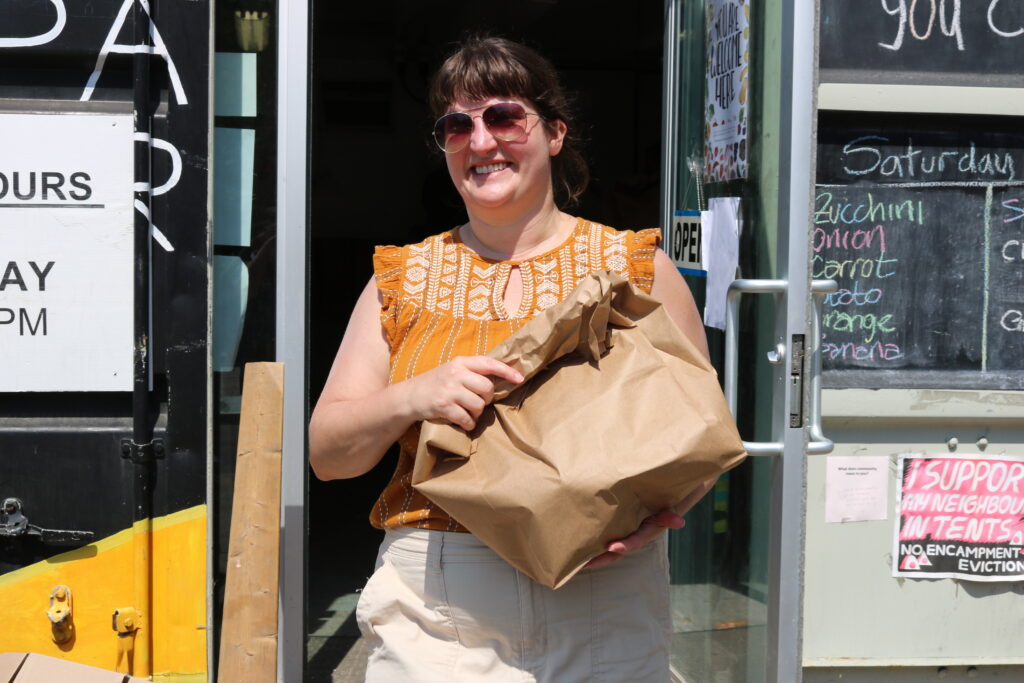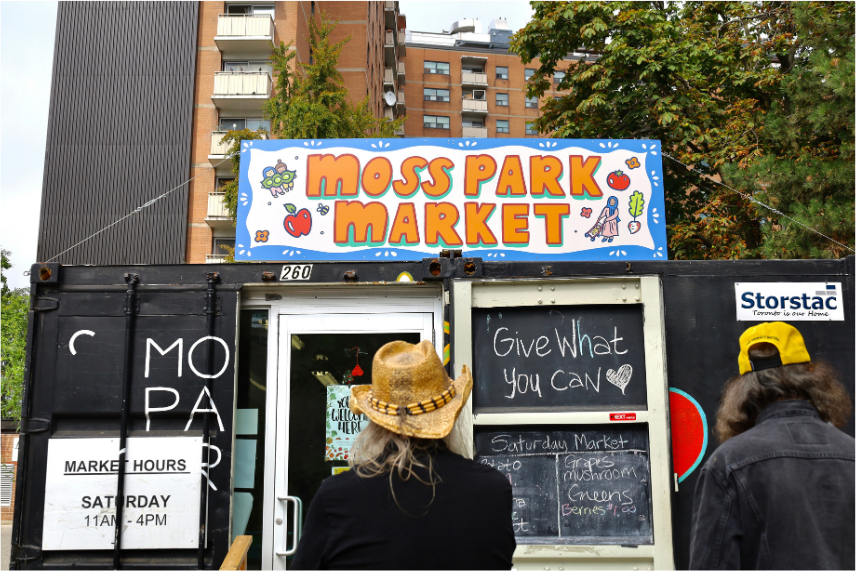By Winnie Czulinski –
Whether it’s mild and spring-like or bitter winter, the Saturday lineup is mostly patient and expectant. There are wheeled walkers, canes, some conversation about welfare/OAS/ODSP income and Ontario Line construction nearby. Some people are silent.
What everyone is in line for is basic: the fresh foods and staples we all need to live. And this site is a welcome option in a city where farmers’ markets can be pricey, many foodbanks require making online appointments, and some residents have mobility issues getting to food stores.
The weekly Moss Park Market attracts up to 500 people, from 11 a.m. to 3 p.m. at 260 Queen Street East on the grounds of Toronto Community Housing’s Moss Park Apartment Complex. Bags are filled and handed out in a unique 20-by-16-foot structure, with heating, electricity and air conditioning.
Moss Park Market is an initiative of food advocacy organization Building Roots, and its charity partner Growing Neighbourhoods Foundation. Lisa Kates and Darcy Higgins co-founded Building Roots in 2013 as a grassroots social venture to promote urban agriculture and access to fresh foods.
“When you do something like this you do it as a passion,” says Kates. “But opening a store was not an option. So, we thought ‘what about a shipping container?”
There are actually two containers, one donated. This sturdy twin set has had national press, for being Canada’s first year-round produce market in such a structure.
Like most worthwhile projects, it took trial and error, says Kates. Earlier managers “ran it more like a business,” aligning pricing with recipients’ income levels. For a time, it charged five dollars for a whole bag, “but some can’t do that. Now it’s PWYC, and if you can’t pay, that’s fine.”

A Moss Park Market bag might contain staples like potatoes, and more culturally-requested produce like collard greens, callaloo, bok choy, bitter melon, long squash, plantain, garlic and ginger. There may be bread by Toronto shops like Johnson Family Bakery, or just-baked biscotti from Moss Park Espresso.
Many fruits and vegetables come from facilities like Toronto Metropolitan University’s rooftop garden and Ashbridge Estate Urban Farm (in Leslieville), hosted by the Ontario Heritage Trust.
At the market, there are tables with urns of coffee, hot chocolate, cider, plant-based milk, baked goods and plenty of conversation. There’s diverse information from nearby facilities such as Sherbourne Health, and sometimes naloxone kits. Organizations such as Equitable Action for Change may provide counselling sessions. Market-goers can get connections to shelters and other resources.
Amy Rumbolt, director of community engagement (and former volunteer/market manager), says “This vibrant neighbourhood that has so much more to share than what it typically gets credit for, is an area that’s struggling from food apartheid …We are doing our best to sink our heels in and make sure that the spaces we have access to, continue to feed the residents of the neighbourhood.”
By healing human roots, the goal is to address greater social issues like poverty and isolation. (“Up with democracy!” roars one patron, coming away from the coffee-and-snacks table with a steaming cup.).
There’s also delivery service for housebound folks. To date, Building Roots has brought residents 6000+ food bags filled with fresh/local produce, staples, meals and treats, to 500+ households.
The initiative has a strong partnership with FoodShare, supporting urban farms across Toronto, with help from seeds to composters. The Sprott Foundation dedicated to addressing homelessness and providing fresh, healthy food, is a funder.
Building Roots recently received funding to revitalize an old community garden beside the market. And like last year, spring and summer hold the promise of diverse activities such as poetry, accordion music, drum circles, the Queer Wellness Fair.
Volunteers can help with working the garden, building benches, delivering food hampers, and more (Visit https://buildingroots.ca/ and click “Get Involved.”)
Donations are welcome, says Charles Chiu, director of development & communications, whether $10 for a nutritious bag of produce or $100 to help 10 families with fresh food for a week (https://buildingroots.ca/donate/).
Chiu says Building Roots commits to its staff. “The current living wage for Toronto is $25.05/hour, and we pay all full- and part-time employees above that.”
The charity’s online pictures of bags of basic produce for marginalized, sometimes homeless, Torontonians contrast with detailed “We Are Hiring!” posts for Building Roots positions paying $50,000-60,000 and full benefits for a four-day week.
But the message seems clear: it takes well-paid, experienced and well-cared-for advocates to help create change in at-risk neighbourhoods.




